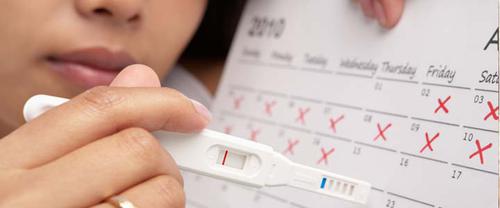Missed Period Negative Pregnancy Test - Best Tips for You
Imagine asking the average person on the street "What is most likely to indicate to a woman that she is pregnant?” The first answer will probably be that she has missed a period. Even without knowing the science behind menstruation, most people are aware that women who are fertile but not currently pregnant have a period roughly every 28 days, when she releases an unfertilized egg. On the other hand, if the egg is fertilized, it implants within the uterus, and pregnancy, not menstruation, is the result.
Consequently, if you are still within your fertile years, and you are sexually active, a missed period is a good indication that you are pregnant. At this stage, the simplest method to confirm your suspicions is a home pregnancy test.
What's Wrong with the Test?
You can usually get a pregnancy test at your pharmacy, an online store, or even your local supermarket. The test involves checking your urine to see if the hormone human chorionic gonadotropin (hCG) is present. This hormone is only produced during early pregnancy.
Rarely, you may have both a negative pregnancy test and no period, but still be pregnant.
- You may take the test too early. Once the fertilized egg enters and implants into the uterus, hCG production starts. Since it may take a few days for the egg to implant, you may have both a missed period and a negative pregnancy test.
- You may take the test too late in the pregnancy. Once you are four to five months along, hCG is no longer produced as the placenta takes over the job of looking after the fetus.
- The urine you used is diluted. During the day, as you drink water, the amount of hCG in your urine may be at a lower concentration. When you are taking a pregnancy test, it is always best to test first thing in the morning.
- You could be having multiple births. The hormone hCG increases when there is more than one baby involved. Ironically, a higher-than-expected level of hCG can result in a false negative.

What Else Could Cause Missed Periods?
You've had a missed period and negative pregnancy tests, so what else could it be? Common reasons could be medical conditions, your age, or lifestyle factors.
1. Medical conditions
Problems with the thyroid gland can cause all sorts of problems, from weight gain or loss, to mental issues such as depression, and difficulties with menstruation. If you suffer from an over-active thyroid gland, (hyperthyroidism), you may experience irregular periods.
You could also be on medication which is intended to alter your menstrual cycle. Using Depo-Provera or a Mirena device can mean that your periods are exceptionally light or even non-existent. Other medications which may interfere with periods include some chemotherapy medications or anti-depressants. You should always ask your doctor about any potential side effects of medication.
2. Age-related issues with menstruation
When you first start to menstruate, your periods tend to be irregular, so determining whether or not you are pregnant by any disruptions to your cycle will be difficult. Similarly, as you enter your forties, your periods will be less frequent. Once your periods stop for about a year or longer, you are likely to be in menopause.
3. Lifestyle factors
- Weight – too much or too little – can affect your period. Estrogen is stored in fat, and it is estrogen which helps to determine when eggs are released. Too much estrogen can disrupt ovulation. On the other hand, if you are underweight, or lose a considerable amount of weight in a short time, your body may not have sufficient estrogen to allow ovulation to happen. It is common for women with anorexia to have no periods.
- Even though it was once considered a natural and effective birth control method, it is still possible to become pregnant while you are breastfeeding before your periods resume. After giving birth, it takes time for your periods to restart, and if you are breastfeeding it can take upwards of a year. You may still ovulate but without a menstrual flow.
- Disruptions to your normal daily pattern of living can lead to changes in your cycle. You may notice, for example, if you are a shift worker, and change from day shift to night shift, that your periods may fluctuate. You may also find that when you are under stress, or sick, that you are less regular.

Missing Periods – When Should You Worry?
Unless you are in the early stages of puberty, are menopausal, or are actually pregnant, you should expect to have a period roughly every 28 to 35 days. If your periods are irregular, stop for no reason, or if you notice a change--for example, extremely heavy bleeding--there may be causes for concern.
-
You may have an ectopic pregnancy. An ectopic pregnancy is when the egg is fertilized, but implants outside of the uterus. You may notice symptoms, such as heavy pain on one side. It is crucial that you see your doctor, as ectopic pregnancies are dangerous and potentially fatal.
-
Another medical condition which can affect menstruation is polycystic ovarian syndrome (PCOS). This can lead to problems with ovulation and fertility. PCOS has also been linked to an increase in the likelihood of developing type-2 diabetes.
-
Endometriosis occurs when tissue which should grow inside the uterine wall (the endometrium) starts growing outside it. This can cause problems such as intense pain during periods or sexual activity, bowel problems, and infertility.
If you are at all concerned with your menstrual cycle, consult your doctor.
Still Think You Are Pregnant?
Even if you have missed periods and negative pregnancy tests, you may still have other symptoms like nausea, bloating, and breast tenderness which indicate that a baby is on its way. Wait a few days and take the test again. Make sure you follow all the instructions and that the test hasn't been damaged or has passed its use-by date. And of course, see your doctor, who can provide a definitive diagnosis.
Check out this video for more information and for ideas as to what your next steps should be:
YOU MAY LIKE
-
Strange Feelings in the Stomach: What to Know in the First Trimester of Pregnancy
-
Foods You Must Avoid During Pregnancy
-
Masturbating in the Early Pregnancy: Is It OK and Safe?
-
Skip Your Period on the Pill - Best Recommendations
-
Breast Development – What Every Girl Should Know
-
Take a Breather – Why Pregnant Women Are Often Breathless
-
Epsom Salt and Benefits in Pregnancy
-
Erotic Massage Vital Points That Boost Your Sex Life Quality
-
When Do Pregnancy Cravings Start - Best Tips for You
-
Miss One Contraceptive Pill? Don't Panic!
